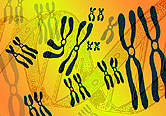Persistent leukemia-linked mutations in remission samples tied to increased relapse, worse survival
WEDNESDAY, Aug. 26, 2015 (HealthDay News) — For adult patients with de novo acute myeloid leukemia (AML), persistent leukemia-associated mutations in ≥5 percent of bone marrow cells from remission samples is linked to increased risk of relapse and worse survival, according to a study published in the Aug. 25 issue of the Journal of the American Medical Association.
Jeffery M. Klco, M.D., Ph.D., from the Washington University School of Medicine in St. Louis, and colleagues examined whether genomic approaches could provide novel prognostic information for adults with de novo AML. The authors performed whole-genome or exome sequencing on samples obtained at disease presentation from 71 patients with AML treated with standard induction chemotherapy. In addition, deep digital sequencing was performed on paired diagnosis and remission samples from 50 patients: 25 from the initiation cohort and 25 additional cases.
The researchers observed no improvement in outcome assessment for analysis of comprehensive genomic data over current standard-of-care metrics. Persistent leukemia-associated mutations in at least 5 percent of bone marrow cells at remission were identified in 24 of the patients with samples at presentation and remission. These patients had significantly reduced event-free and overall survival (hazard ratios, 3.67 and 2.86, respectively). Similar findings were seen for patients with intermediate cytogenetic risk profiles (hazard ratios, 3.32 and 2.88, respectively).
“These data suggest that this genomic approach may improve risk stratification for patients with AML,” the authors write.
Two authors disclosed financial ties to the biotechnology industry.
Copyright © 2015 HealthDay. All rights reserved.








